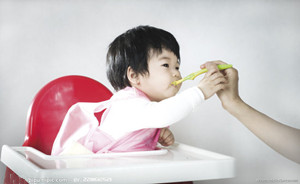

母乳喂养的孩子智商更高
Mǔrǔ wèiyǎng de háizi zhìshāng gèng gāo
Links Tighten Between IQ, Breast-Feeding
新近一项研究得出结论称,延长母乳喂养期可使孩子更加聪明.该研究发表于美国医学会主办的《美国医学会杂志•儿科学》上.
Breast-feeding longer can make children smarter. That's the conclusion of a study published Monday in JAMA Pediatrics, a journal of the American Medical Association.
就许多方面而言,这项研究并不会让母乳喂养的提倡者感到意外,他们在很早之前就提出母乳喂养与认知能力之间存在关联,现在他们只不过是又多了一项支持他们论点的研究.对于那些持怀疑态度的人,他们则可能会坚持认为最重要的是婴儿母亲的智商,或是认为针对母乳喂养的社会压力会导致家长不堪重负,而这本身会给孩子的发育带来麻烦.然而,目前这些研究发现可能会给公共健康倡议者推动提高母乳喂养比例的行动提供强有力的支持.美国疾病控制与预防中心的数据显示,母乳喂养的比例在婴儿出生伊始为75%左右,但在婴儿一周岁时便降低至25%的平均水平.
In many ways, the study won't surprise proponents of breast-feeding, who have long posited a connection between nursing and cognition and now have an additional piece of research to back up their argument. Skeptics could likely stick to the view that what matters most is how smart a baby's mom is, or that social pressure to breast-feed can have its own problems for children's development by creating stressed-out parents. However, the findings are likely to add muscle to public-health advocates' push to increase breast-feeding rates, which start out around 75% but slump to an average of 25% at a baby's first birthday, according to the Centers for Disease Control and Prevention.
这项研究并不是最早将母乳喂养与智商水平联系在一起的研究,但研究人员称它的实验样本大,而且它还排除了婴儿母亲的智商及孩子接受的教育等变量,因此更加让人信服.该研究的第一作者、哈佛医学院的儿科学助理教授曼迪•贝尔福特指出,以往的研究在对可能影响孩子智商的其他因素进行调整方面存在问题,而且它们的实验样本较小, 或是未考虑到母乳喂养期的时间长短.
The JAMA study isn't the first to study a link between nursing and intelligence, but researchers say it is more conclusive because of its size and how it has isolated variables such as the mother's IQ and the child's upbringing. Previous studies have had difficulty adjusting for other factors that might influence a child's IQ, were limited by their small size or didn't account for length of nursing, said Mandy Belfort, the JAMA study's lead author and assistant professor of pediatrics at Harvard Medical School.
新近这项研究根据他们可接触多少书籍等因素调查了每个孩子的生活环境,并对每个孩子的母亲进行了智商测试.他们还针对可能影响智商的因素提出了详细的问题,比如儿童保健、家庭收入及父母的教育程度等,然后利用统计模型剔除这些因素.贝尔福特称,她希望他们得出的是母乳喂养与智商之间的真实联系.
The latest study examined and rated each child's environment based on factors such as how many books are available, and gave each mother an IQ test. They also asked detailed questions about factors that might influence IQ, such as child care, income and parental education. They then subtracted those factors using a statistical model. Dr. Belfort said she hopes that 'what we have left is the true connection' with nursing and IQ.
她指出,母乳喂养很难通过随机性的实验进行研究,因为把一部分孩子分在非母乳喂养组是不道德的行为,所以研究人员只能选择像她所展开的那种观察性研究.从1999年至2010年期间,波士顿儿童医院的研究人员对1,312名婴儿及他们的母亲进行了跟踪研究.他们要找出其中有多少孩子在一周岁时依然在吃母乳,然后分别在这些孩子三岁和七岁时对他们进行智商测试.
Breast-feeding is hard to study in a randomized trial because it is unethical to put some children in the non- group, Dr. Belfort said, which leaves researchers with observational studies such as the one she conducted. Researchers at Boston Children's hospital followed 1,312 babies and mothers from 1999 to 2010. They found out how many of those children were still consuming their mothers' milk at their first birthday, and then tested the children's intelligence at ages 3 and 7.
那些在一周岁后依然吃母乳的孩子,他们在三岁时的语言理解能力测试中得分更高,这表示他们对所听到的话的理解能力要高于喝配方奶的同龄人.到七岁时,母乳喂养的孩子在口头及非口头智商测试中的得分也更高.
Children who were still nursing after a year had higher receptive language scores at age 3, which means they understood what was being said to them better than their formula-fed peers. At age 7, the breast-fed children scored higher on verbal and nonverbal intelligence tests.
贝尔福特称,一整年的母乳喂养可使孩子的智商分值比非母乳喂养的孩子高出四分左右,考虑到智商的平均分值大约为100分,这算得上一个大幅提升.这只是针对在饮食中会吃些母乳的孩子而言,那些在大约六个月大、开始食用固体食物之前只吃母乳的孩子具有更大的智商优势.
A full year of nursing would boost a child's IQ by about 4 points over a child who didn't nurse, said Dr. Belfort, a significant bump considering that IQs average around 100. That is for children getting some breast milk in their diets; those consuming only breast milk before starting to eat solid foods around six months of age saw even greater advantages.
词语解释
母乳喂养 (mǔrǔ wèiyǎng) breast-Feeding
提倡者 (tíchàng zhě) proponent
支持 (zhīchí) back up
儿科 (érkē) pediatrics
随机 (suíjī) randomize
(Source: myechinese.com)
Breast-feeding needs more public support
2013-03-13Copyright ©1999-2018
Chinanews.com. All rights reserved.
Reproduction in whole or in part without permission is prohibited.